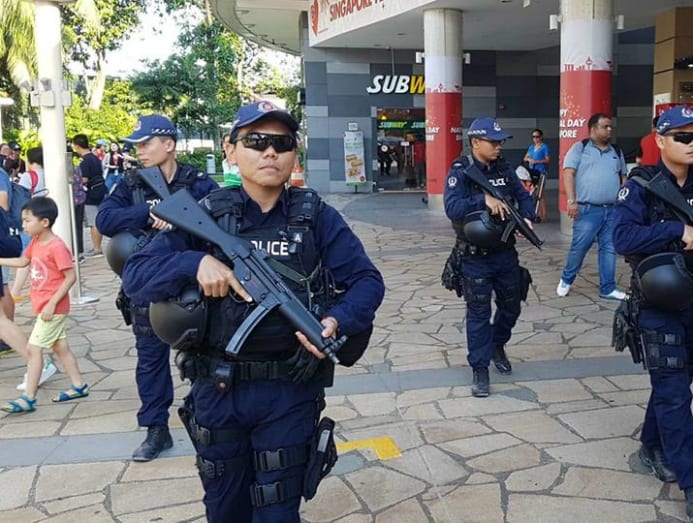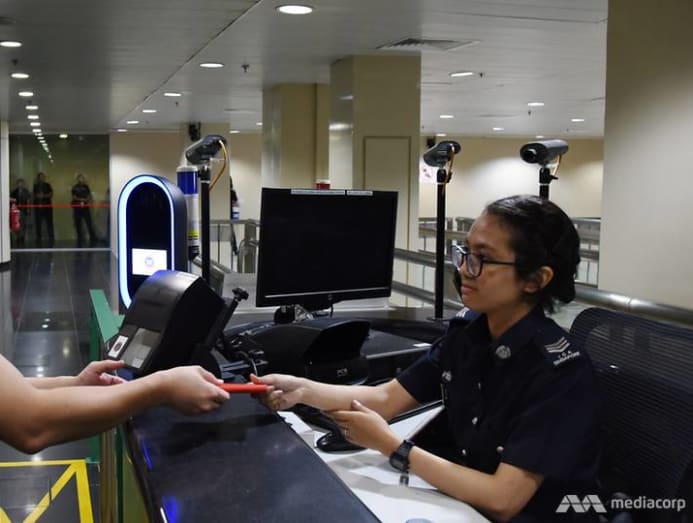Commentary: No one forgets where they were on 9/11. What happens next is what counts
SINGAPORE: At 9.03pm in Singapore, the 2nd plane hits the South Tower.
I am riveted to my figurer screen, editing a story in the Straits Times newsroom, when I hear my colleagues go from confused shock to horrified shouting.
"Plane crash?" I enquire my colleague. The answer comes once again and once again as CNN replays scenes of United Airlines Flight 175 crashing into the tower like a recurring nightmare.
Suddenly, my news editor is in front of me. He points and barks elementary instructions, "Get over to the Television. You're doing the forepart page. Just go along writing."
All night, alerts aught and zing across my calculator screen; above me, scenes of desperate people leaping to certain death from the flaming upper storeys of the Globe Merchandise Center or running in the streets, covered in dust and confusion.
There is then much burn down and smoke in the sky, you lot tin almost smell it halfway across the world.
Nosotros rushed our first edition to print at about 1.30am. Only the piece of work goes on to continue the story moving for the last edition for the forenoon news.

A young reporter brings me a government printing release announcing that the alert level has been raised in Singapore and wonders aloud why, if the events were happening in New York City.
I remind her that Singapore is host to American warships and troops. "Our own planes and helicopters are likely to be on patrol all night. You lot'll hear them", I told her.
SURVEILLANCE FOR SECURITY
Twenty years on, we may not recollect of 9/eleven much more once a year. Just its legacy pervades our lives, even in Singapore.
The attacks brought on a strange chill of vulnerability and spurred an immediate reaction in security.
Engineering science arising from terror'due south fallout has go and then much a office of routine that about of u.s. exercise non even consider how this initially uneasy union has continued to insert itself into our daily lives.
Take surveillance cameras: I don't know how many there were dorsum in 2001 only by 2030, Singapore aims to have more than 200,000 police cameras in performance, more than twice the ninety,000 installed since 2012.
Then there are the closed-circuit television receiver (CCTV) deployed in shopping malls, by banks, supermarkets, offices and other workplaces that have been installed in the proper noun of security.
On the streets and on public send, it is no longer alarming to see armed police officers or soldiers on patrol. Office buildings require visitors to present photograph identification and sign in.
Many companies besides require staff to clothing identification passes or use them to pass through secured office doors. Before 9/11, offices rarely locked their doors during part hours.
We welcomed the omnipresence of surveillance and enforcement on condition that they keep united states of america safe from attack. Nosotros constantly hear from our leaders that it is a matter of "non if, simply when" an assail will happen in Singapore.
OUR SENSE OF COMMUNITY
Last calendar week, a friend sent me a motion picture of the famous roti john at the one-time Taman Serasi food centre.
It reminded me how a Jemaah Islamiyah (JI) jail cell with Al-Qaeda links in Singapore had planned to park truck bombs there.
Just earlier they could, the Internal Security Section (ISD) moved in and arrested fifteen individuals in December 2001. That plot to attack embassies, US military avails and commercial interests, and Yishun MRT station, was foiled. ISD later on made more arrests and uncovered plans that identified water pipelines and Changi Airport as potential targets.
I oft-forgotten detail is that a Singaporean Muslim had come forward with the crucial lead to the JI arrests. And it chilled me to retrieve how JI could have otherwise disrupted our lives and torn apart our social textile.
In the wake of 9/11 emerged heartbreaking stories of racism and violence confronting the Arab and Muslim communities in the United states of america. Did nosotros in Singapore look at one another suspiciously afterwards the attacks? Did we suddenly fear the terror in our lawn?
Thankfully, we never reached the phase of turning on ane some other. According to a 2022 report by the Institute of Policy Studies, most Singaporeans may exist quick to associate terror with race or religion, but say they would not acquaintance local communities with extremist groups misappropriating their labels.
THE TRANSFORMATION OF AIR TRAVEL
The most immediate bear upon of ix/11 for many was felt at the airport. An American associate in Singapore was to have flown home on United Airlines on Sep 12 but had to scramble for alternative plans and accommodation when government closed off United states of america airspace.
Information technology took days for the global excess to be cleared after noncombatant air traffic was allowed to resume. The US created the Transportation Security Administration to manage security duties at airports not long subsequently, with uniformed military personnel patrolling airports.
On my next trip to New York in 2002, queues were long, tempers were short. The nail clipper and paper cutter I always carried in my hand luggage were confiscated by a snarling airdrome officeholder and flung into a bin.
Security screening at Changi Airport for US-bound flights became more than stringent and much more than visible overnight. At the gate for United Airlines, queues followed roped lines, manned by uniformed constabulary checking passports and asking detailed questions.
Most of us now carry a biometric passport, one detail in a tsunami of security changes since ix/11.
With the advances in technology, today it carries not but our personal data, but also our iris and fingerprint biometrics - verified by scanners at airports, which take become standard at merely about all airports since 9/xi. We just stand up and look where nosotros are told.

A close friend and I had planned a trip to California from Singapore around 2004. Although he had lived in Singapore for decades, he carried a Malaysian passport.
His application for a U.s.a. visa was stuck in limbo, as were for many others from Muslim-majority countries, and afterwards nearly a twelvemonth, we gave up.
SHAPING WHO We ARE IN THE AFTERMATH
The events of ix/eleven have left an indelible mark on Singapore and the world. The set on created anxiety and unease.
But in one case our initial fears lifted, we did more than than accept the material changes to our lives. We kept the ensuing vigilance and resolve to stay united as a community.
Anybody remembers where they were on 9/11. It shook us to our cadre and changed how we collectively saw the world.
Then, we started going to work, shaping our world as we at present saw information technology. It is unlikely that we will revert to a pre-nine/eleven way of looking at security or air travel, but information technology has reminded us how our home is more precious than ever.
Every September eleven, my mind goes back to that night in the newsroom.
It was a Tuesday in Singapore. At 8.46pm, the beginning airplane crashes into the North Tower. But it's what comes later on in the hours, days and years that truly counts.
Irene Hoe is a author, editor and coach and has been a journalist for many decades.
broadwaypapon1936.blogspot.com
Source: https://cnalifestyle.channelnewsasia.com/commentary/911-attacks-terrorism-changed-singapore-295681
0 Response to "Commentary: No one forgets where they were on 9/11. What happens next is what counts"
Post a Comment